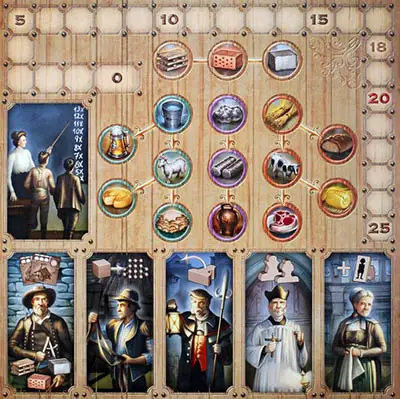
In a two-player game all the rules for a 3- or 4- player game are applicable with the following exceptions:
Setup

First a starting player is chosen. The starting buildings are prepared as for a 3-player game (or decide to quick start by using a random distribution with the Village Centers). Both players receive all of their playing pieces.
A third Village Center is setup as a neutral village. A third color is used for the neutral village. The neutral village receives the 4 remaining starting buildings. Now, there should be 2 buildings of each type in play.
Example: One player begins with the woodcutter, clay quarry and goat farm, and the other with the woodcutter, stone quarry and goat farm, then the neutral village will receive the stone quarry, clay quarry, and 2 wells.
The neutral buildings are placed in turn by each of the players and populated with a neutral villager. A total of two couples are available to be placed. The player who isn't the starting player places building and villager first.
The remaining neutral villagers are placed in the neutral Village Center. Once the neutral village is completed, the players build their own villages according to the normal rules.
Each player places one coin in the neutral Village Center and in the village of their opponent. 1 coin of the neutral color is placed ready next to the neutral village.

Game Play
The basic flow of the game is unchanged.
Players can interact with their opponent's village as well as the neutral village, and may therefore marry their villagers into both villages.
The neutral village does not act and receives no Action phases. Nevertheless the neutral village can make certain moves.
Instead of taking his own action, the active player may take the neutral coin and execute an action on behalf of the neutral village - but only if the neutral coin is still available next to the village.
He may do this even if he has no coins of his own left. The only actions that can be taken in this way are the "Priest" and "Builder" actions.
Priest
The active player can take a villager from the neutral village and marry it into his own village.
Builder
The active player may build one of the open available building tiles in the neutral village and place a neutral villager within it. To build this building no goods have to be paid.
Only 1 player can use the neutral village for exactly 1 action per round.
The neutral villagers cannot be placed in anyother way. They do not produce, are never put to sleep, cannot have children in the neutral village, and so on.
End of the Round
The round ends immediately when only coins of one color are left in play. Should this color be the neutral color, the starting player changes.
Continue Reading
